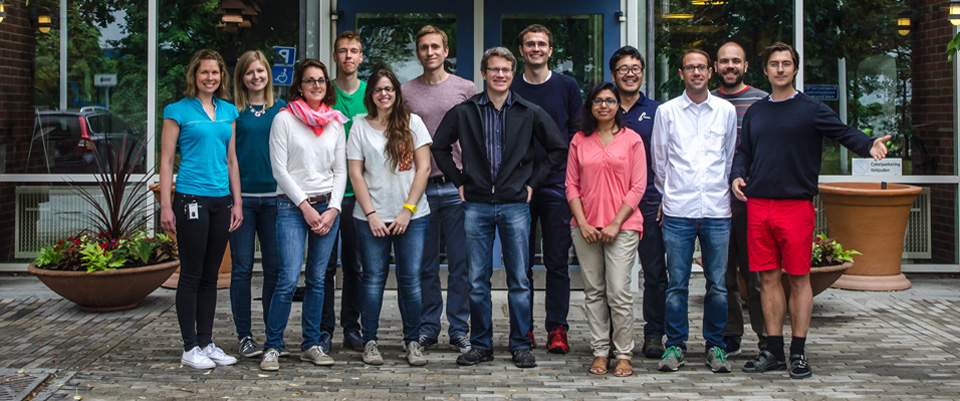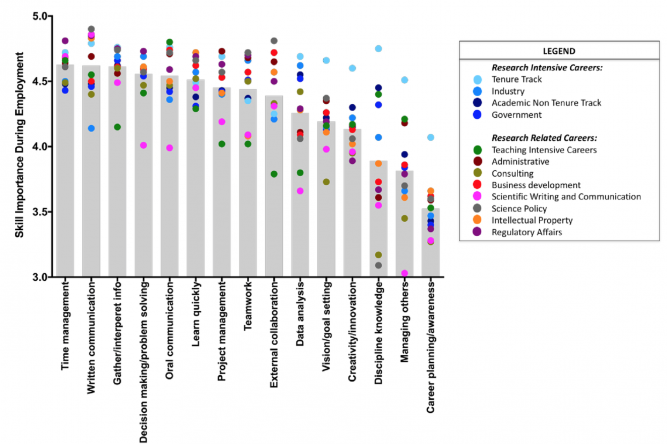Blog Tag career
Falling behind: postdocs in their thirties tire of putting life on hold
This one hits home. As someone who did 4 postdocs in 3 different countries, I can see myself here. Particularly the waiting - always the waiting. Waiting to get that dream job. Waiting to buy a house. Waiting to start a family. At some point, my wife and I just had to take the plunge. Without permanent contracts. Without stable positions. Sweden certainly made that choice much easier with generous parental leave. However, the uncertainty and the effects upon our careers was real. I am happy to say that it has worked out for us in the long run, but it shouldn't be this way. It is insane that after spending the time to obtain a PhD, we then spend years and years in unstable positions. Academics needs to do better if it wants to retain people.
An evidence-based evaluation of transferrable skills and job satisfaction for science PhDs
To shift a bit from the doom and gloom of the previous posts - this article highlights the value of a scientific education. So while the career prospects in academics are few - the training received along the way is applicable to a range of careers. This article makes the very important point that the skills acquired during a scientific education will provide value throughout a lifetime. Scientists are highly trained individuals who have a unique skillset that is marketable. It is therefore all the more important that PhDs and postdocs are trained in non-academic careers - and provided with advice on how to use their unique talents in a range of different careers. After all, the current reality is that a career outside of academics is no longer an "alternative career" for most people. The fact is that the vast majority of scientists will leave academics for satisfying and fruitful careers in a range of jobs - and we should stop pretending otherwise.
Why women leave academia and why universities should be worried
Worrying developments in academics - and a further example of how academics is fundamentally broken. They report that "88% of the women don't even want academic careers, nor do 79% of the men! How can it be this bad? Why are universities such unattractive workplaces?" Think about that for a minute - the vast majority of people pursing higher education do not want a job in higher education. An academic career has become so unattractive that most people have lost interest. Perhaps this could be interpreted as these people have become smart and sufficiently educated to recognize the ponzi scheme of academics in that there is an insufficient number of positions for aspiring academics. So rather than slog through an unending stream of postdocs with low pay and no job stability, they have decided to move on. Or perhaps these people were all young inspiring academics that become so disillusioned with the process during their education that they want nothing to do with academics. Either way, this is a worrying development and a clear sign that there needs to be a fundemental shift in how academics functions.
Surviving academia as an early career researcher: an unreliable guide
Useful advice and checklist on survival - and hopeful success - in the academic environment. Many students and postdocs make the mistake of thinking that success is only about the papers. While publishing our scientific findings is of course paramount to our profession - there is so much more. For the vast majority of us without multiple NSC (Nature, Science, Cell) papers - we need a strategy for success. It is vital to get your ideas and your brand out into the academic sphere. Academics is communication - mixed with a healthy dose of sales. If we do not communicate our ideas, then we are not pushing the field and our science forward. Think - networking, conferences, social media, outreach, etc. This article does a nice job of summarizing how to put that all together.
The Postdoc Crisis
Academics is certainly not an easy career choice - and a post-doctoral position is a bit like trial by fire. It is obvious that everyone who does a postdoc will not be able to have a research career (in either academics or industry). It is just another sign that the acdemic system is broken. If you choose to do a postdoctoral stint, it is smart to be clear on the reasons for doing so - and your subsequent career options....
WHY SO MANY YOUNG SCIENTISTS ARE PUSHED OUT OF ACADEMIA
A rather frank but fair comment on the nature of the PhD process (link). The odds of obtaining an academic appointment are consistenly getting worse. Even if you are one of the lucky few to obtain a position, chances are that you will be expected to cover your own salary, lab expenses including rent, overhead, administrative support etc - with no hope of tenure in sight. A further indication that the academic process is broken??
Rescuing US biomedical research from its systemic flaws


















Leave a message